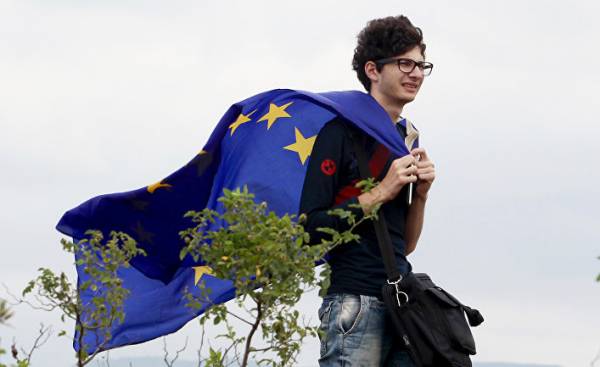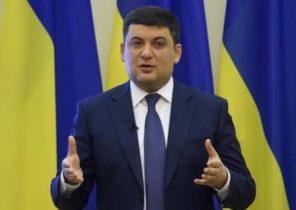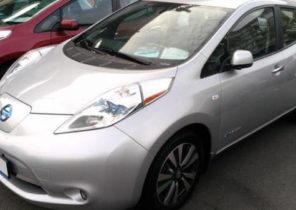
On March 28, the country joined the visa-free Schengen area covering the territory of all member countries of the Union, except Ireland, great Britain, Croatia, Cyprus, Romania and Bulgaria. It also does not apply to countries outside the Union: Iceland, Liechtenstein, Norway and Switzerland. And although this is a very important achievement for Georgia, oddly enough, in a sense, it can be even more important for the EU itself. First, it proves the ability of the EU to fulfil its commitments, and secondly, reminds us that he is interested in neighbors that can stimulate reforms, and to maintain unity in any political environment. The decision on Georgia adopted at the very moment when Britain began the withdrawal from the Union, so that he will be welcomed by those who still believe in the ideal “whole, free and peaceful Europe”.
In Georgia celebrate bezviz, Prime Minister Giorgi Kvirikashvili on Twitter called the day “historic” and the capital Tbilisi were decorated with flags of the country and the EU. European leaders warmly welcomed Georgia. EU Commissioner for enlargement Johannes Hahn urged Georgians to “enjoy Europe” and the Latvian President Dalia Grybauskaite welcomed the “commitment to freedom and democracy.”
This is a really important achievement, given the hostility of the European electorate — not only in relation to migrants from outside the EU, but also the entire concept of freedom of movement in Europe. It was one of the factors that was used last June in support of Brexit. This year’s thesis is in the election campaigns in the Netherlands, France and Germany.
Georgia, in turn, has earned praise for well done homework, conducted to meet the criteria of security, border control, and migration. In addition, Georgia has dealt with organized crime and visa disorders that troubled Europe. The process required to reform many spheres, including to enact anti-discrimination laws — quite a sensitive issue for the conservative Georgian society.
On the one hand, Georgia has got some advantages. Negotiations on visa-free regime started in 2012 to began the wave of migration from the Mediterranean region. Mostly Orthodox Georgia caused fewer concerns in matters of culture and security which arose because immigrants from the Middle East and North Africa. In addition, the maximum number of Georgians who will take advantage of the new features are quite small, given that the population is less than 4 million and a trip to Europe out of reach for most residents.
Have a visa-free regime has limitations: it allows the citizens of Georgia with biometric passports to be 90 days within 180 days does not entitle you to work or permanently accommodation and may be suspended for reasons of security. But it brings immediate practical fruits: much more Georgians will be able to see Europe and to establish personal and business contacts.
However, the geopolitical significance bezveza for Georgia — a lot more.
First, it shows the people of Georgia that perseverance is not in vain, it is important to understand for those who had to give up on the EU Association did not give still tangible benefits. This should inspire them to continue the reforms. In addition, it will help the Pro-Western Georgian leaders to resist Russian propaganda, insisting on the futility of the Western vector for this country.
Second, the closer Georgia to the EU, the harder it is for NATO to assert that the country does not meet the standards of the Alliance. On the contrary, many friends of Georgia claimed that for her the path to NATO is through the EU.
Thirdly, the fact that the visa regime is available to residents of the breakaway territories, such as the Pro-Russian Abkhazia and South Ossetia, must show that they have another way.
Fourth, Beavis shows Georgia and other countries in the region that the EU fulfills its obligations even in a complex political environment and strained relations with Moscow. What can be said about Russia playing cat-and-mouse with the neighbors, at first, and then selecting the “sweets” such as visa-free travel and access to markets, depending on the compliance of other countries.
In the end, it gives hope that the dream of a United, free and peaceful Europe, born after the Cold war, is still alive. While the Euro-Atlantic institutions are faced with many problems and doubt in the support of NATO from the new American President Donald trump, some believe that bezviz is the maximum that Georgia could obtain from the West. But it may mean that the policy of EU enlargement is still working. Formal invitation of Montenegro to NATO last year showed that an open-door policy of the Alliance is also still in effect. So the solution for Georgia proves that the possibilities for further integration with the EU is still there. The Georgians will likely interpret it that way, once the country’s leaders continue to say that their ultimate goal is EU membership.
It is important not to overdo it. To become a full member of the EU and NATO should have a long difficult path, and given the political climate, it is important to understand how long may take this process. But the EU’s decision to grant Georgia visa-free regime — a sign that there is progress, and the Union has not exhausted itself. Even if some Europeans choose to leave, the EU will remain a beacon for other countries. So the Georgians this week have something to celebrate like everybody else.
Alexandra Hall Hall, the former British Ambassador to Georgia.







